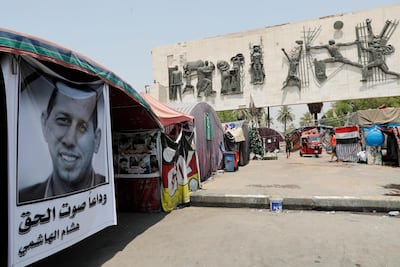Iraqis are demanding further information regarding the assassination of prominent scholar Hisham Al Hashimi, despite the conviction of his killer, activists and experts told The National on Wednesday.
He was gunned down by two attackers on a motorcycle nearly three years ago, leading to condemnation across the country.
Mr Al Hashimi, who was also a journalist and commentator, had been receiving threats from Iranian-backed militias in the lead-up to his murder in July 2020, at the age of 47.
On Sunday, a court issued a death sentence against his killer, police officer Ahmed Hamdawi Al Kinani, after convicting him of terrorism charges.
However, some Iraqis have questioned Al Kinani's involvement in the murder.
"The killers enjoyed some kind of impunity of the system, and were able to get away, one has been charged but obviously there are more and there’s questions around his involvement, whether he is a scapegoat or not," Renad Mansour, director of the Iraq Initiative at London's Chatham House think tank told The National.
"There is a lot of social pressure from Iraqis to find the assassins and that pressure pushes the government to show that it's doing something," he said.
In reality, "the system and accountability in Iraq is so weak" that assassinations will continue to happen, he added.
Mr Mansour said "most killers who have targeted civil society, activists and researchers remain outside of jail because of the role they serve in protecting this toxic political system and the impunity they enjoy".
Security and political expert Mr Al Hashimi was one of Iraq's most important researchers on extremist movements, providing crucial insights on ISIS and other militant groups to politicians and diplomats .

He was also a supporter of the country's anti-corruption protest movement.
A relative of Mr Al Hashimi said the family was pleased with the verdict but said those who ordered the assassination should also be brought to justice.
“Until now, we have not learned who is backing the killer and who gave the orders to execute,” the relative said, speaking on the condition of anonymity due to fear of persecution from armed groups.
Some activists are demanding the government provides a comprehensive investigation on the events surrounding Mr Al Hashimi's murder.
“Iraqi civil society and the victim's family were hoping to conduct an in-depth investigation with the accused to reveal the causes and motives of the crime and the parties involved," Hassan Wahab, an activist from the Amal Association human rights group, told The National.
“This would reveal the instigators of the killing against activists and opinion-makers.”
Mr Wahab said fair trials are an important requirement of the system "and must comply with the procedures of the international human rights laws".
Many Iraqi activists have been killed, with Iran-backed militias often believed to be the culprits.
The public are not expecting any good to come out of this conviction, Suhalia Al Assam, a women's rights activist in Baghdad, told The National, as the perpetrators for many crimes conducted over the years have not been brought to justice
"There are many people who have been linked to this crime but have not been charged. We want a fullinvestigation on all the murders that has occurred in the past," said Ms Al Assam.
"Even those who are in prison enjoy some kind of freedom because of their links to the system, so justice has not prevailed."
"The perpetrators who have killed the voices of Iraqi society must be punished in front of the public to make a statement to stop these crimes from occurring."
Mr Al Hashimi left behind his wife, three sons and a daughter.


